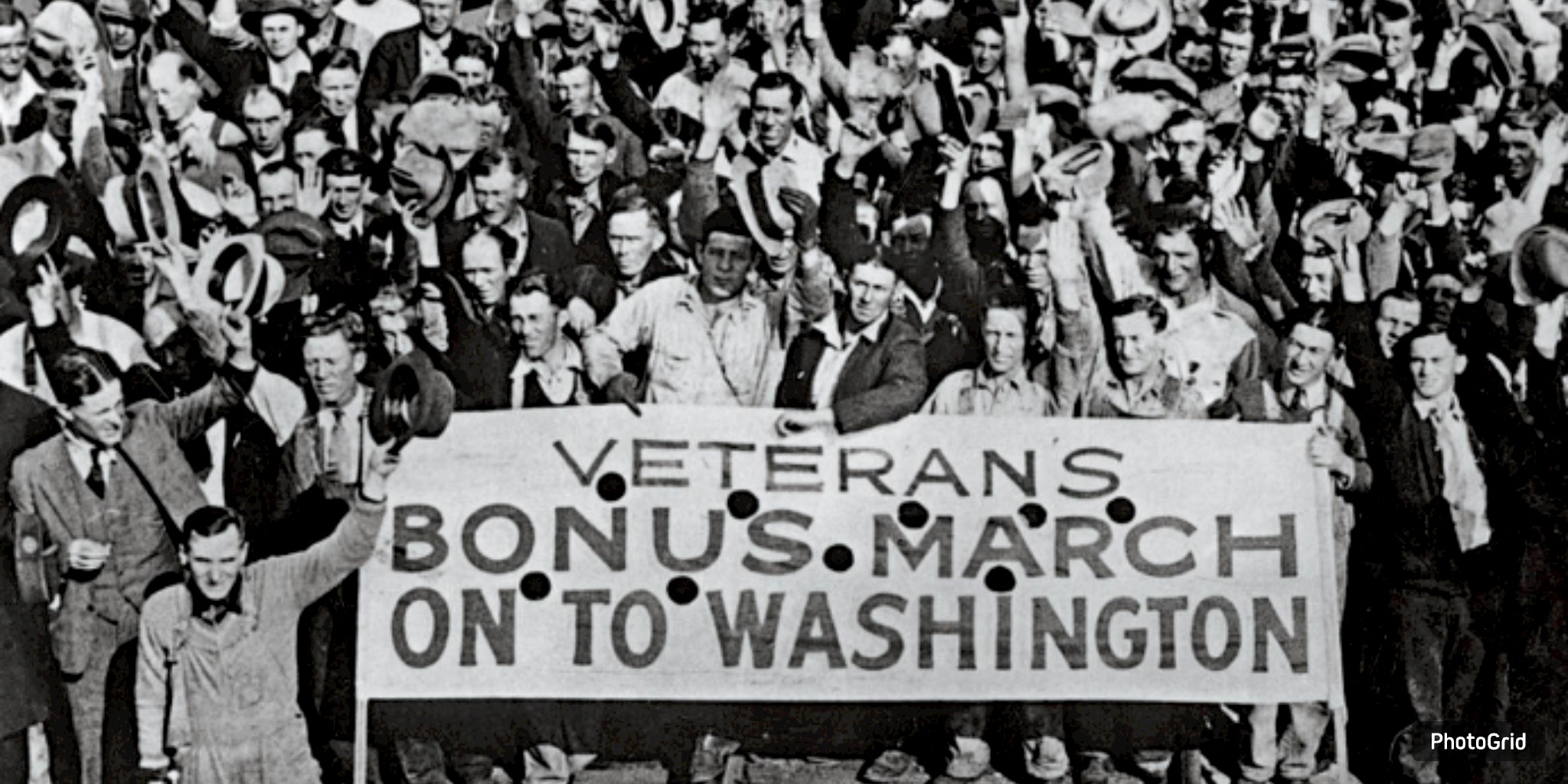


On July 28, 1932, the streets of Washington, D.C., were transformed into a battleground, as bayonets, gas grenades, and cavalry surged through, marking a moment that would be immortalized in the annals of American military and political history.
In a decisive move, Army Chief of Staff Gen. Douglas MacArthur, with the backing of then-Maj. George Patton and Maj. Dwight D. Eisenhower, led U.S. troops in the forceful expulsion of thousands of World War I veterans. These veterans had gathered in the capital, hoping for economic relief amid the hardships of the Great Depression.
Gathered in Washington that summer, nearly 20,000 veterans and their families, referred to as the Bonus Army, set up camp in abandoned buildings and on the muddy banks of the Anacostia River. They were insisting on the immediate disbursement of bonuses that had been guaranteed to them under a law established in 1924—payments that were not scheduled to be made until 1945.
Under the leadership of former Sgt. Walter Waters, a diverse group gathered from all corners of the nation, with hundreds making their way from Texas, some hitchhiking or traveling on freight trains to reach the capital.
In the early stages, the veterans maintained a calm and orderly presence, garnering the backing of D.C. Police Chief Pelham Glassford, a veteran himself, who played a crucial role in organizing essential supplies and services. A group identifying as the Bonus Expeditionary Force organized marches and engaged in lobbying efforts directed at Congress.
In a significant turn of events, the House approved a bill aimed at facilitating early payments, yet the Senate decisively rejected the proposal. As Congress concluded its session without taking any action, a significant number of veterans remained behind, fueled by a mix of anger and desperation.
In the early hours of July 28, a confrontation between veterans and law enforcement escalated tragically, prompting President Herbert Hoover to sanction military intervention to clear the demonstrators. The aftermath left a significant portion of the nation in disbelief.
Under MacArthur's command, U.S. Army troops, fully equipped, advanced boldly, disregarding Hoover's directive to stay within the confines of downtown. Cavalry units, sabers at the ready, advanced in formation beside five massive tanks from the World War I era. Soldiers moved forward, equipped with gas masks, as they launched tear gas grenades into the makeshift communities.
In the face of opposition from certain demonstrators, who hurled bricks and bottles, the military refrained from using live ammunition. Tragically, three lives were lost, and many others sustained injuries. Women and children were also subjected to gas attacks. Tragically, an infant has been reported to have died due to inhalation.
As the flames engulfed the camp at Anacostia Flats that night, MacArthur proclaimed a decisive victory. He subsequently asserted that he had quashed a Communist uprising. “They had reached the determination… that they were on the verge of seizing… control of the government,” he conveyed to the media, avoiding any recognition of the protest's economic origins.
President Hoover endorsed the military action, asserting that “a challenge to the authority of the United States Government has been met, swiftly and firmly.” However, the public's sentiment shifted rapidly. Footage from the newsreel displayed in cinemas elicited a chorus of boos from the audience. Critics raised concerns about the aggressive tactics employed. Alabama Senator Hugo Black criticized the deployment of military forces against starving veterans, labeling it as both “militaristic” and excessive.
Veterans came back feeling disenchanted. Congressman Wright Patman, the architect of the bonus bill, faced criticism from conservative circles while receiving praise from the impoverished and jobless communities. His advocacy played a pivotal role in defining his extensive congressional career and his involvement in the coalition supporting Franklin D. Roosevelt’s New Deal.
The incident involving the Bonus Army had a profound effect on the reputations of all parties concerned. Biographer William Manchester characterized MacArthur’s bold disregard for presidential directives and his dramatic command on the battlefield as “flagrantly insubordinate.” In a notable moment, Eisenhower, who would eventually ascend to the presidency, reportedly counseled MacArthur to avoid the streets. Patton also made a significant impact—infamously wielding his saber to quell demonstrators hurling objects.
Looking back, a consensus among historians emerges: the Bonus Army was not a scheme orchestrated by Communists but instead a heartbreaking intersection of economic hardship and governmental neglect. MacArthur would eventually temper his remarks, referring to the protesters as a “vanguard of a starved band.”
















From breaking news to thought-provoking opinion pieces, our newsletter keeps you informed and engaged with what matters most. Subscribe today and join our community of readers staying ahead of the curve.